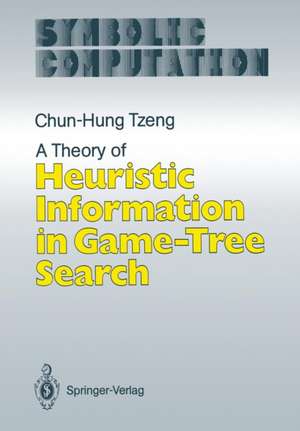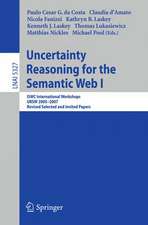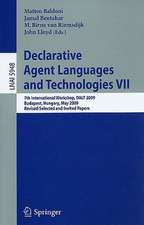A Theory of Heuristic Information in Game-Tree Search: Symbolic Computation
Autor Chun-Hung Tzengen Limba Engleză Paperback – 8 oct 2011
Din seria Symbolic Computation
- 20%
 Preț: 350.21 lei
Preț: 350.21 lei - 20%
 Preț: 651.89 lei
Preț: 651.89 lei - 20%
 Preț: 647.61 lei
Preț: 647.61 lei - 20%
 Preț: 649.09 lei
Preț: 649.09 lei - 20%
 Preț: 648.44 lei
Preț: 648.44 lei - 20%
 Preț: 639.35 lei
Preț: 639.35 lei - 20%
 Preț: 653.06 lei
Preț: 653.06 lei - 20%
 Preț: 642.19 lei
Preț: 642.19 lei - 20%
 Preț: 651.09 lei
Preț: 651.09 lei - 20%
 Preț: 659.97 lei
Preț: 659.97 lei - 20%
 Preț: 645.31 lei
Preț: 645.31 lei - 20%
 Preț: 648.44 lei
Preț: 648.44 lei - 20%
 Preț: 650.27 lei
Preț: 650.27 lei - 20%
 Preț: 646.47 lei
Preț: 646.47 lei -
 Preț: 394.29 lei
Preț: 394.29 lei - 20%
 Preț: 326.46 lei
Preț: 326.46 lei - 20%
 Preț: 342.28 lei
Preț: 342.28 lei - 20%
 Preț: 339.99 lei
Preț: 339.99 lei - 20%
 Preț: 641.01 lei
Preț: 641.01 lei - 20%
 Preț: 657.99 lei
Preț: 657.99 lei - 20%
 Preț: 648.26 lei
Preț: 648.26 lei - 20%
 Preț: 661.47 lei
Preț: 661.47 lei - 15%
 Preț: 638.89 lei
Preț: 638.89 lei - 20%
 Preț: 657.67 lei
Preț: 657.67 lei - 20%
 Preț: 652.73 lei
Preț: 652.73 lei - 20%
 Preț: 330.42 lei
Preț: 330.42 lei - 20%
 Preț: 709.98 lei
Preț: 709.98 lei - 20%
 Preț: 834.69 lei
Preț: 834.69 lei - 20%
 Preț: 656.03 lei
Preț: 656.03 lei - 20%
 Preț: 757.48 lei
Preț: 757.48 lei - 20%
 Preț: 355.67 lei
Preț: 355.67 lei - 20%
 Preț: 328.27 lei
Preț: 328.27 lei - 20%
 Preț: 330.24 lei
Preț: 330.24 lei - 20%
 Preț: 342.96 lei
Preț: 342.96 lei - 20%
 Preț: 555.53 lei
Preț: 555.53 lei
Preț: 324.64 lei
Preț vechi: 405.80 lei
-20% Nou
Puncte Express: 487
Preț estimativ în valută:
62.12€ • 64.86$ • 51.41£
62.12€ • 64.86$ • 51.41£
Carte tipărită la comandă
Livrare economică 04-18 aprilie
Preluare comenzi: 021 569.72.76
Specificații
ISBN-13: 9783642648120
ISBN-10: 3642648126
Pagini: 120
Ilustrații: X, 107 p.
Dimensiuni: 170 x 244 x 6 mm
Greutate: 0.2 kg
Ediția:Softcover reprint of the original 1st ed. 1988
Editura: Springer Berlin, Heidelberg
Colecția Springer
Seriile Symbolic Computation, Artificial Intelligence
Locul publicării:Berlin, Heidelberg, Germany
ISBN-10: 3642648126
Pagini: 120
Ilustrații: X, 107 p.
Dimensiuni: 170 x 244 x 6 mm
Greutate: 0.2 kg
Ediția:Softcover reprint of the original 1st ed. 1988
Editura: Springer Berlin, Heidelberg
Colecția Springer
Seriile Symbolic Computation, Artificial Intelligence
Locul publicării:Berlin, Heidelberg, Germany
Public țintă
ResearchCuprins
1 Introduction.- 2 Games and Minimax Values.- 2.1 Finite Perfect Information Games and Game Trees.- 2.2 Zero-Sum Two-Person Perfect Information Games.- 2.3 Subgames and Game Graphs.- 2.4 Example 1: G1-Games.- 2.5 Example 2: P2-Games.- 2.6 Minimax Values, the Minimax Procedure and the Alpha-Beta.- Procedure.- 3 Heuristic Game-Tree Searches.- 3.1 The Conventional Heuristic Game-Tree Search.- 3.1.1 Static Evaluation Functions.- 3.1.2 The Back-Up Process.- 3.2 Heuristic Arguments and the Pathological Phenomenon.- 3.3 New Back-Up Processes.- 3.3.1 The Product-Propagation Procedure.- 3.3.2 The M & N Procedure.- 3.3.3 The *-MIN Procedure.- 3.3.4 Average Propagation.- 4 Probability Spaces and Martingales.- 4.1 Borel Fields and Partitions.- 4.2 Probability Spaces.- 4.3 Random Variables.- 4.4 Product Spaces.- 4.5 Conditional Probabilities and Martingales.- 5 Probabilistic Game Models and Games Values.- 5.1 Probabilistic Game Models.- 5.2 Strategies and Game Values.- 5.2.1 Non-randomized Strategies.- 5.2.2 Randomized Strategies.- 5.2.3 Minimax Values.- 5.3 Pb-Game Models.- 5.4 Gd-Game Models.- 6 Heuristic Information.- 6.1 Examples: P2- and G1-Game Models.- 6.1.1 P2-Game Models.- 6.1.2 G1-GameModels.- 6.2 Formulation of Heuristic Information.- 6.3 Heuristic Search.- 6.4 Improved Visibility of a Heuristic Search.- 7 Estimation and Decision Making.- 7.1 Random Variable Estimators.- 7.2 Comparison of Estimators.- 7.3 Decision Making.- 7.3.1 Decision Models.- 7.3.2 Decision Qualities.- 8 Independence and Product-Propagation Rules.- 8.1 Product Models.- 8.2 Product Heuristic Information and Product Heuristic Searches.- 8.3 Product-Propagation Rules.- 9 Estimation of Minimax Values in Pb-Game Models.- 9.1 More About Probabilities on Pb-Game Trees.- 9.2 The Conditional Probability of a Forced Win, p(h,l).- 9.3 An Approximation of p(h,l).- 10 Estimation of Minimax Values in Gd-Game Models.- 10.1 Estimation in G1-Game Models.- 10.2 Estimation in Gd-Game Models.- 11 Conclusions.- References.

















